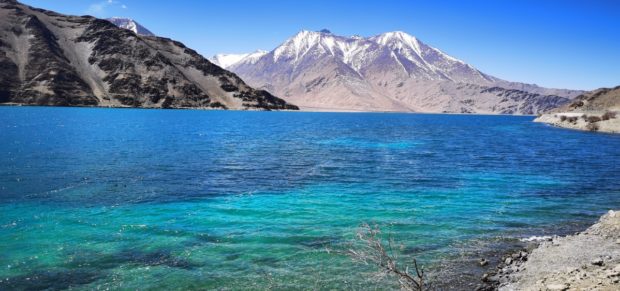Half of Tibet set as ecological protection zone

Photo taken on April 8, 2022 shows the Pangong Tso Lake in Rutog county of Ngari prefecture, Southwest China’s Tibet autonomous region. China Daily/Asia News Network
BEIJING — The Tibet autonomous region has listed half its land area under the scope of an ecological protection red line, environmental authorities said at a news conference in the regional capital Lhasa on Monday.
The ecological protection red lines cannot be crossed and are located in areas with critically important ecological functions that should be strictly protected.
Since the 18th National Congress of the CPC in 2012, the region has spent over 12.7 billion yuan ($1.82 billion) on various types of ecological protection projects, according to the regional ecological department.
The region’s overall ecosystems remain stable and the environment is being constantly improved. Tibet is one of the regions in the world with the best environmental quality, Shui Yanping, deputy head of the department, said at the news conference on Monday.
Over the past decade, with unprecedented importance attached and investment injected, the region has achieved all-around progress in ecological civilization construction and environmental protection, Shui said.
Article continues after this advertisementIn 2021, the regional forest coverage rate reached 12.3 percent, and the comprehensive vegetation coverage of grassland grew to 47.1 percent, he added.
Article continues after this advertisementThe population of rare wild animals has also seen a restorative increase. The population of the black-necked crane, a first-class national protection species in China, has increased from less than 3,000 in 1995 to over 10,000, while the number of Tibetan antelopes has increased to more than 300,000.
Over the past decade, significant strides have been made in pollution prevention and control, with 99 percent of the days in recent years classified as “good” in terms of air quality in the region’s seven cities and prefectures. Water quality in key rivers and lakes has reached or exceeded Class III, the third best in China’s five-tier surface water quality classification system.
Tenzin Tsering, a ranger in Buchu township of Nyingchi city, said nature and wildlife have received better protection in recent years thanks to a series of ecological protection policies and measures implemented by the local forestry and grassland bureau.
Working as a ranger in his home township, Tenzin Tsering regularly patrols the forest, the mountains, and along the rivers with his colleagues, and they make sure the wild animals are not hunted, and the natural environment is not deliberately damaged as a result of human activities.
“Now, there are few people in our places still hunting or logging. Most people are highly aware of ecological protection. The rural villagers no longer have to rely on hunting and logging to meet their basic living needs,” said Tenzin Tsering, adding that people used to go hunting and logging decades ago.
“Nowadays, the government attaches great importance to environmental protection, and the villagers have been reminded not to cross the red line of environment protection from multiple channels,” he said.
“Thanks to the efficient protection efforts by the government and our fellow villagers, our hometown remains an unpolluted beautiful place that is enriched with abundant natural resources.”
RELATED STORIES
China closes Tibet’s Potala Palace after COVID-19 outbreak
Dalai Lama: China’s leaders ‘don’t understand variety of cultures’